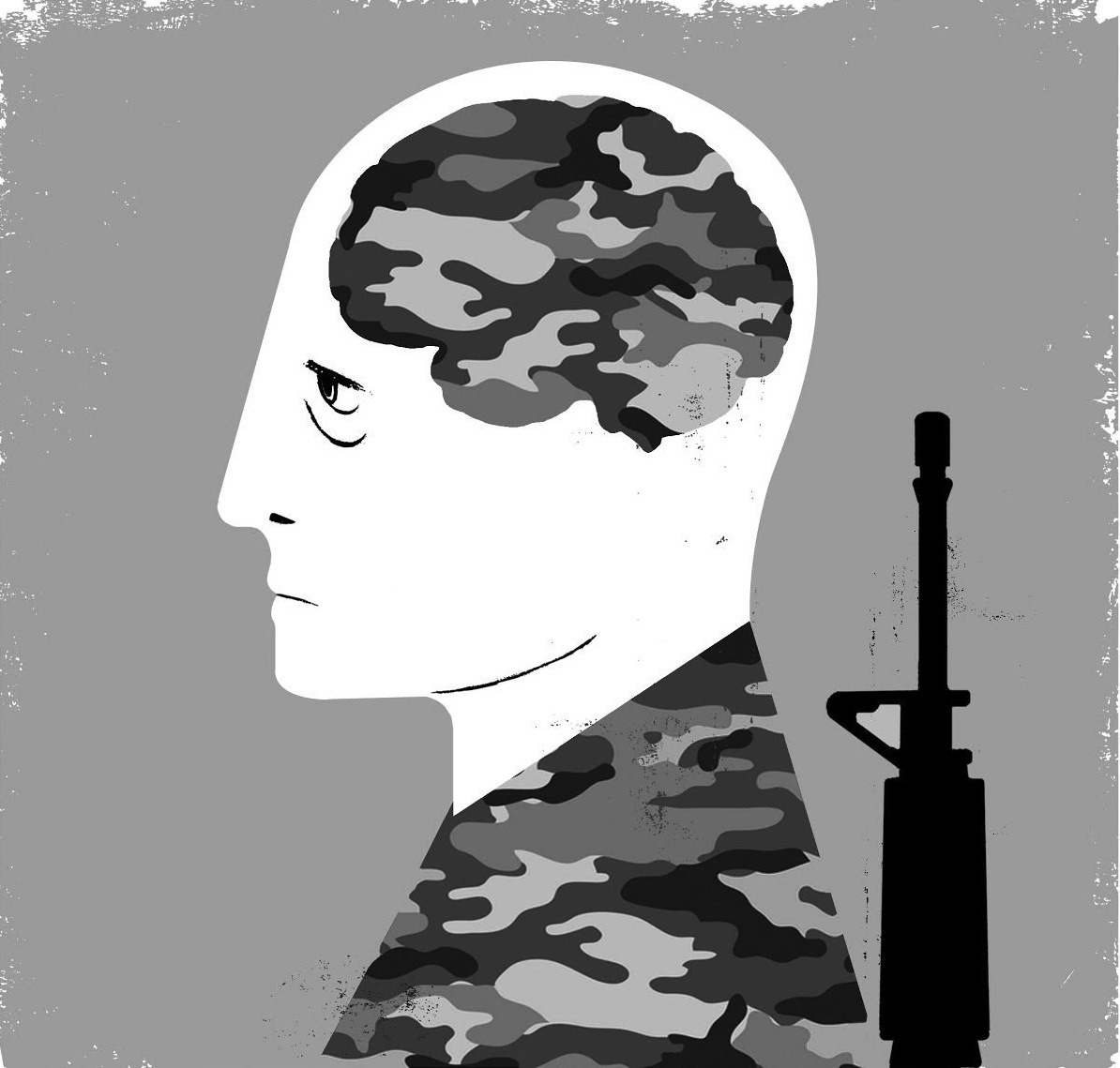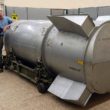“Every effort was made for years to hide the truth and deny the medical research needed to fully treat the U.S. troops suffering from Gulf War Syndrome. —Former U.S. Senator Don Riegle, 2014.
During and immediately after the first gulf War, more than 200,000 of 700,000 U.S. troops sent to Iraq and Kuwait in January 1991 were exposed to nerve gas and other chemical agents. Though aware of this, the Department of Defense and CIA launched a campaign of lies and concocted a cover-up that continues today.
A quarter of a century later, the troops nearest the explosions are dying of brain cancer at two to three times the rate of those who were further away. Others have lung cancer or debilitating chronic diseases, and pain.
More complications lie ahead.
Sirens wailed daily, but officers in charge said the chemical-detection alarms were faulty. They were not.
According to Dr. Linda Chao, a neurologist at the University of California Medical School in San Francisco: “Because part of their brains, the hippocampus, has shrunk, they’re at greater risk for Alzheimer’s and other degenerative diseases.”
Moreover, a 2009 Georgetown University study found that the Gulf War veterans’ brain damage was similar to that of survivors of the 1995 sarin attack in a Tokyo subway.
At a 1997 Congressional hearing, Reserve Navy Captain Julia Dyckman, a registered nurse and Gulf War veteran, said:
“You might ask what it is like to be a Gulf War veteran after six years … When you eat, you are constantly sick and have intermittent diarrhea. Mobility is difficult due to swollen joints and muscle aches. Severe headaches are intermittent. Sometimes you forget what you are doing and what you were going to do. Pain and fatigue are constant companions. You are forced to deal with constant denials from the Pentagon that ‘nothing happened’ during the war. These statements confuse medical providers who then doubt your credibility … the VA says this illness ‘doesn’t exist’ or is ‘all in your head.'”
At first, the DOD was adamant: No troops were exposed.
“No information … indicates that chemical or biological weapons were used in the Persian Gulf,” wrote Secretary of Defense William Perry and Chairman of the Joint Chiefs John Shalikashvili in a 1994 memo to 20,000 Desert Storm veterans. Strictly speaking, they were right: No weapons were used. The nerve agent sarin was in the fallout from the U.S. bombing or detonating of Iraq’s weapons sites.
Perry and Shalikashvili knew.
As Alan Friedman wrote in The Spider Web: The Secret History of How the White House Illegally Armed Iraq, the Reagan and Bush administrations, which backed Iraq in its 1980-1988 war with Iran, approved of U.S. companies selling chemical agents and equipment to Iraq, including “a huge petrochemicals complex called PC2. Western intelligence also knew that PC2 was capable of generating chemical compounds to make mustard and nerve gas.”
Donald Riegle, a Democratic U.S. Senator from Michigan, held hearings about the veterans illnesses in 1993-1994. He told me the decision by Reagan and Bush “to secretly help Saddam Hussein build his biological and chemical weapons was a monstrous strategic error that eventually led to the tragedy of Gulf War Syndrome, which killed and disabled so many unprotected American troops.”
Breathing Poison
During January-February 1991, when the U.S. bombed Iraq’s weapons plants and storage sites, poisonous plumes floated across the desert to thousands of U.S. troops based on the Saudi border. Sirens wailed daily, but officers in charge announced that the chemical-detection alarms were faulty.
They were not.
A Czech chemical-weapons detection unit found “trace concentrations of sarin, a nerve-paralyzing substance” drifting into Saudi Arabia. French, British and U.S. intelligence units found similar evidence.
This remained the official story throughout the 1990s. DOD experts at Presidential Advisory Committee hearings in 1997 were adamant. According to Marine Corps Lieutenant Commander Art Nalls, “Detections were at very low levels and in the mind of the analysts … indicative of a false alarm.”
Tracy Elledge, a former combat engineer and one of the veterans I interviewed, said, “Alarms went off all the time … Our officers told us they were false and to disconnect them.”
However, Elledge and others were breathing poison.
In a 2012 Neuroepidemiology article, Jim Tuite, a Gulf War illness expert, and Dr. Robert Haley, an internist/epidemiologist at the University of Texas Southwestern Medical Center, wrote that “large numbers of U.S. and Coalition military personnel were exposed to levels of sarin … high enough to cause irreversible or other serious, long-lasting adverse health effects.”
Elledge was on a team setting C-4 plastic explosives at Khamisiyah, one of Iraq’s largest weapons sites. “We used timed fuses, which gave us 10 minutes to get a half mile away,” he said. “But even at that distance, the smoke was terrible. And we were sent back in to make sure we got everything. The officers never told us the old rockets were filled with sarin, so we didn’t wear any protective gear.”
Jim Bunker was a lieutenant with the First Infantry Division who had trained as a demolition expert. He told me that “before the DOD blew up the ammunition, it sent papers to the battalion officers and intelligence people with clear markings to help them identify chemical weapons. Then on March 2 or 3, the DOD sent the ordnance disposal team to verify which chemicals were there. We don’t know what they found, because once the troops started demolishing them and getting sick, the reports disappeared.”
Bunker said that when troops first became ill, his battalion commander, Col. John Gingrich, radioed headquarters to find out what was happening. He was told: “It’s the heat.”
“We knew this wasn’t true,” Bunker said. “It was only 85 degrees, and we’d trained in over 100 degrees—without people getting sick like this.” The next day, division commander Maj. General Thomas Rhame and Col. Michael Dodson came to their base. “They told Gingrich to be quiet about the men’s symptoms,” Bunker said.
“There’s no way for people to admit to what really happened to us.”
Dodson, now head of the Armed Services YMCA, did not respond to calls. Rhame, retired and until recently, vice president of the Association of the U.S. Army, told me, “I don’t deny the troops were ill. But I don’t remember that incident and it’s not in my nature to tell a subordinate not to admit something, because it might embarrass us.” Gingrich told me he remembers the issue about the heat, but not that Rhame and Dodson visited the next day. What does Bunker think? “There’s no way for people to admit to what really happened to us.”
Ron Brown, a soldier with the 82nd Division, watched the demolitions from a mile away. “Within 15 minutes, I couldn’t breathe and my head was about to split open,” Brown said. “Soldiers were nauseous, dizzy and had diarrhea and muscle spasms. About 30 of us went to the medic, who gave us Motrin and told us to drink water.”
Later that month, Bunker almost died. As the demolitions continued, his symptoms became more severe. “First, I couldn’t control my muscles,” he said. “But in a couple days, I had convulsions and collapsed. After this, they medevacked me to hospitals in Saudi Arabia and Germany, and then to the U.S.”
Don’t Tell the Press
Bunker is now designated 100-percent disabled. He explains that this means that “your disability prevents you from your full capable earning power for your educational level.”
Brown and Bunker, who run the National Gulf War Resource Center, say none of the soldiers knew what was happening. And the DOD, CIA and VA hid the truth.
For example, on March 23, 1991, the ARCENT NBC (Army Central Command Nuclear, Biological and Chemical staff) sent a secret, now de-classified, memo to the XVIII Airborne Corps. “ARCENT has positive confirmation (by urinalysis) of cml (chemical) agent blister casualty in VII corps. We are not to bring this up to the press. If press asks, XVIII abn (airborne) Corps has had no cml (chemical) casualties.”
Later in 1991, UNSCOM (the United Nations Special Commission) found nerve gas in the remains of rockets the U.S. blew up in Khamisiyah and told the Pentagon. In November, although the Joint Chiefs briefed the CIA, other intelligence agencies and the White House, no action was taken. (Six years later, the DOD de-classified the UNSCOM memo, posting it on its Gulflink website. Seven months after that, the CIA had it removed—claiming it revealed too much about methods it used to gather intelligence).
At Riegle’s hearings, when DOD and CIA witnesses admitted that UNSCOM inspectors had found traces of nerve gas at Khamisiyah, they still insisted they “could not confirm that any U.S. troops were at the site.” Also, they claimed they had no reports of “any soldier or civilian experiencing symptoms consistent with chemical warfare agent exposure.” Moreover, they argued that the plumes were too small to pose a great risk.
When UNSCOM went public about the nerve gas, DOD and CIA credibility was becoming compromised. And the Riegle hearings, along with those held by then-Rep. Chris Shays, criticized the VA for its failure to properly care for the veterans.
Thus, in 1997, the DOD wrote to the veterans, admitting that U.S. troops did destroy chemical weapons, that nerve gas was released, and that troops “may have been exposed.” But it also claimed “exposure levels were too low to activate chemical alarms or cause any symptoms.” If they had questions, veterans were told to “call a hotline.”
The CIA insisted it didn’t know about the “possible chemical weapons storage at Khamisiyah … until early 1996.” Moreover, it stated that “no military units were located under the first-effects portion of the plume” during demolitions on March 10-11. Also, that “the troops that performed the demolitions had evacuated the area. We know of one that drove briefly through the smoke from the explosion. He had no ill health effects” (italics added).
Because the DOD and CIA still claim troops weren’t exposed to high-enough doses of sarin to hurt them, the VA has denied full disability status to 80 percent of veterans seeking help.
Re-tallying the Toll
Why must the DOD, CIA and VA lie?
Declassified Army memo: “ARCENT has positive confirmation (by urinalysis) of cml (chemical) agent blister casualty in VII corps. We are not to bring this up to the press. If press asks, XVIII abn (airborne) Corps has had no cml (chemical) casualties.”
Patrick Eddington, a CIA analyst from 1994-95 who wrote Gassed in the Gulf, resigned when superiors aborted his attempts to reveal the facts. He explained that, “If you’re DOD, you’re admitting your policies contributed to the veterans’ illnesses. If you’re the VA, you’re admitting you don’t know how to treat the vets. If you’re the CIA, you blew another estimate and that’s not something you want on your resume.” Further, the U.S. would have to admit it sold Iraq chemicals in the 1980s during its war with Iran. The same chemicals that sickened U.S. troops.
From the time the DOD initially admitted that troops may have been exposed, it constantly re-tallied the toll: In 1996, there were 300-400; from 1997 to 2002, there were 5,000, 20,000, 99,000 and finally 101,752—but still, exposure to “very low levels of nerve gas agents.”
When Brown and others tried to obtain their medical records to prove their illnesses were service-related, they learned that the records had disappeared. In a 2007 letter, Dr. Gary Trogdon, chief of the Public Inquiries Section at the Army’s Historical Resources Branch, informed Brown that Army units were told to destroy the “after action” reports, since “there was no space to ship the paper back to the States.” But, Trogdon said, records were kept at the brigade level. When Brown asked Senator Mark Warner to help, he, too, came up empty-handed.
Bunker insists veterans don’t need their records. “If they’re diagnosed with fibromyalgia or had chronic diarrhea for the past four or five years, it’s considered service-connected. It’s presumptive under the law for Gulf War veterans—even if they can’t diagnose the cause. But the VA still denies veterans claims, because they don’t have their medical records.”
However, Bunker and Brown are hopeful. Bunker says President Obama’s new VA Secretary Robert McDonald recently ordered that studies be conducted to determine if certain illnesses should be reclassified as presumptive.
Brown was able to speak with McDonald—after trying unsuccessfully to reach the previous secretary. Brown noted that “just last month, McDonald wrote me [that] he was extending the date for veterans to file presumptive service-connected disability claims.”
Still, when Brown read a 2014 New York Times article about 600 troops exposed to chemical weapons in Iraq from 2003-2011, he called the hotline and was told it was only for newly exposed veterans. When he asked about help for the very sick 200,000 Desert Storm veterans, he was directed to Coleen Baird at Aberdeen Proving Ground, who is studying recent veterans illnesses.
He asked what she could do for them.
Baird said she would refer his request to another office.
Barbara Koeppel is an investigative reporter in Washington, D.C.







I want to thank the Washington Spectator for running this story. And for Ms. Koeppel for writing it. Seeing the Stories in the NY Times has been such a kick in the gut to me. While I am happy our OIF VETERANS. Are being taken care of our Sick Desert Storm veterans continue to be ignored and forgotten.
The President of the United States as Commander in Chief now has a duty of care to fully investigate & remedy this matter.
A failure to do so would be a National Disgrace.
Im one of the Gulf War vets you are talking about. Do you have anything. In writing about them extending the dead line line for filing?
Yes I have a letter from Secretary McDonald he sent me on extending the presumptive end date
what is the dead line date for filing a claim?
anyone watch the house hearings on gulf war illness? a warrant officer in charge of a hazmat team testified about the chemical weapons present. he identified sarin gas and mustard gas. when asked how he knew this he said “it was US ordinance”.. end of is testimony and the hearing for that day… there is NO ONE on the vets side… No one at all… we are truly ass wipes!
There is a lot more beyond all of this. I set up Vets-Help in 2007 originally to prove the existence of GWI. Congress had mandated a study in 2006, which was presented in 2008. Secretary Shinseki overrode the VA and DoD med gurus who discounted the findings.
The US has an unfortunate knack for exposing us to toxic combinations, then discounting any complaints afterwards. We are doing something about it.
We are no different then the Vietnam war vets. Agent orange had no ill effects on them. Their illnesses were all pshycosamatic. UNTIL ENOUGH WERE KILLED OFF then the remaining were given a disability for it. I know my uncle was one of those troops. Now it is our turn to be taken care of. We laid down our lives for our country, now our country needs to take care of us.
I’m a OIF veteran and I’m getting sick ten years later why don’t they help all of us. We did what we were supposed to.
Frank & Kim Avery: There is no deadline for filing a claim. The ending date to which Ron Brown was referring is the date by which any signs or symptoms of your illness from the Gulf War must have been manifest to a degree of 10% or more disabling. In other words, a sign or symptom related to Gulf War Illness must be documented in your medical records or some form of record before that date. This includes any of the chronic multisymptom illnesses or undiagnosed illnesses and the related signs or symptoms laid out in 38 CFR 3.317 [found here: https://www.law.cornell.edu/cfr/text/38/3.317 ]
The current end date listed in the CFR is 31 December, 2016. As I said, though, as long as you have your medical problems documented prior to the end date, you may file a claim for compensation or any other VA benefits at any time, whenever you are ready.
It’s stuff like this that makes me wonder about the mentality and thinking capabilities of those enlisting in our Military forces today. How brain dead can you be if your not seeing what your real worth is to these politicians that keep us in a constant state of war so they and their supporters can keep lining their pockets wit our tax dollars?
I was denied in 2012 citing structural defect causing my GI problems. I filed an appeal September 2012 with no response. Further testing had revealed no structural defect and that was when I filed the appeal. I have a tumor on my left adrenal gland that compensation/pension has nothing to do with sarin, cyclosarin, or soman.
I was never given a copy of my full medical records when discharged. After 4 attempts they finally told me they were mostly lost? What the hell does that mean. They awarded me 10% for my knee injury and that’s it. Nothing for anything gulf war related and nothing for my back injury even though I was hit by a truck and showed all the classic signs of a spinal nerve injury. I call yesterday to check on my new claim and request for records and I get the same old oh you did well let me see I don’t see the paperwork for your request. After 2 hours and 2 managers later I finally get a reference number for my records request but no ETA. I’m thinking its time to get a lawyer.
Go to your US Senator first. VA does not like getting buck slips from Senators – they last longer than Members of the House.
I’ve had heartburn ever since DS. Never had it before except for the occasion too spicy Mexican food (I”m a Texan, duh!). I”ve been on heart burn meds for ever. I used Tums for a couple years before I got tired of having to carry them around and I’ve been on one form or another of Zantac or Prilosec since 1997. I firmly believe its because of something we were exposed to while there. No point in claiming it. VA will just turn it down. Sad.
Little behind the Times…
the Pentagon now has a toll-free number for concerned vets to call: 1-800-497-6261.
Although I have heard and read many articles, and heard many stories on this issue, as well as hundreds of other stories coming out of Washington, D.C. For the life of me I can’t understand how we can stand back and watch this evil slim crawling all over our government in every branch, 3 letter words, et all?
Where has our beautiful country gone, and/or where have we let it get so far out of control?? Isn’t Congress supposed to control the President, etc.? Have any, I repeat ANY of the mighty 3 letter organizations done what they were implemented to do years ago?? NO! And, sad to say, it’s like watching a rat infestation slowly destroy our land. SHAME, SHAME, on all of you. Your lies just get bigger and bigger, and if I were to do what you do, I’d go home every night and vomit from the filth of those lies! Watching your shenanigans insults every American! And you wonder why no one trusts our politicians?? What we need is a big bulldozer to cut through the muck and mire that you have created, and return you to private service. Then you can continue with your selfish lying, cheating and finagling. Isn’t that something to be proud of to share with your loving families. Or, are you training them to do the same thing??Again, SHAME on all of ;you that have participated in any acts such as this, just so you can continue to be the “big honchos” you think you are??
The time is so close, when you and yours will no longer have to worry about cutting each others throats, conniving continually on how not to get caught by the press, or the people!
Oh dear folks, if you only knew how close the time is coming to be reckoned with. Not by another puny earthly being, who wants to be king, but one that IS King. Sodom and Gomorrah were preambles to what must be planned for THIS evil amongst us today.